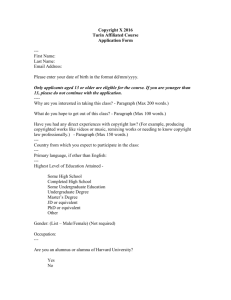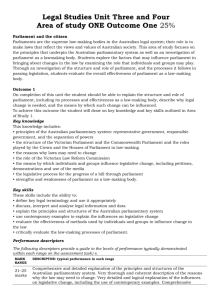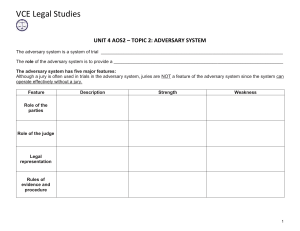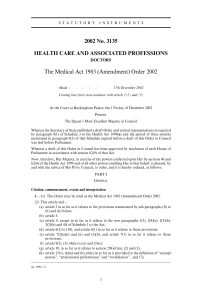exam 2013 final revision sheet
advertisement
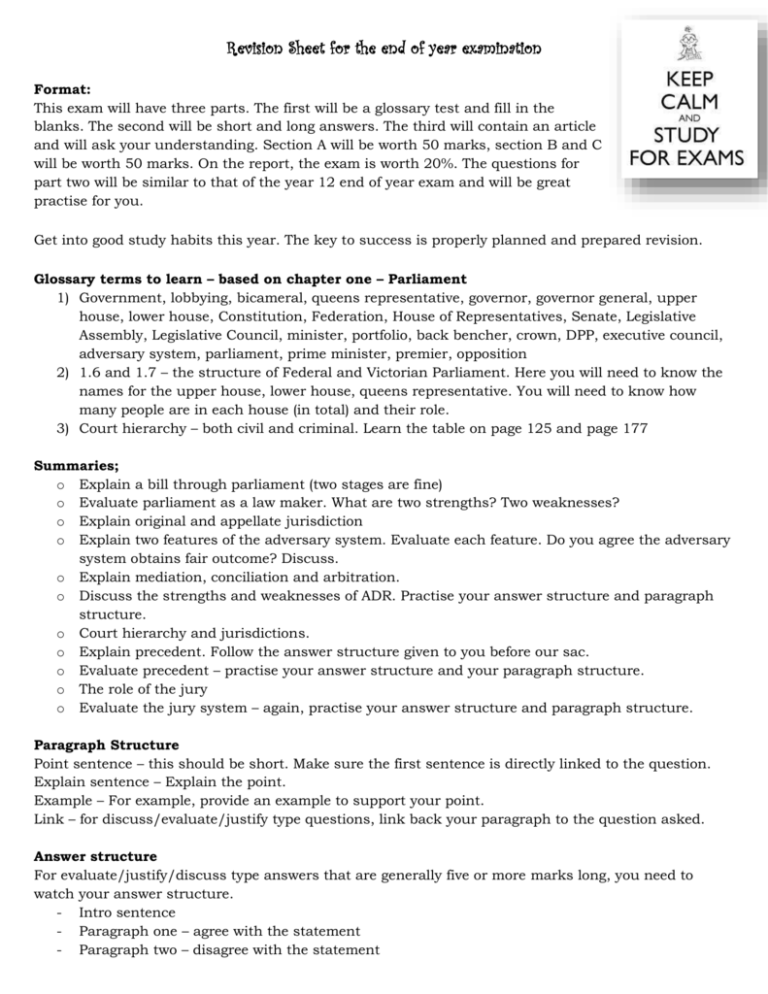
Revision Sheet for the end of year examination Format: This exam will have three parts. The first will be a glossary test and fill in the blanks. The second will be short and long answers. The third will contain an article and will ask your understanding. Section A will be worth 50 marks, section B and C will be worth 50 marks. On the report, the exam is worth 20%. The questions for part two will be similar to that of the year 12 end of year exam and will be great practise for you. Get into good study habits this year. The key to success is properly planned and prepared revision. Glossary terms to learn – based on chapter one – Parliament 1) Government, lobbying, bicameral, queens representative, governor, governor general, upper house, lower house, Constitution, Federation, House of Representatives, Senate, Legislative Assembly, Legislative Council, minister, portfolio, back bencher, crown, DPP, executive council, adversary system, parliament, prime minister, premier, opposition 2) 1.6 and 1.7 – the structure of Federal and Victorian Parliament. Here you will need to know the names for the upper house, lower house, queens representative. You will need to know how many people are in each house (in total) and their role. 3) Court hierarchy – both civil and criminal. Learn the table on page 125 and page 177 Summaries; o Explain a bill through parliament (two stages are fine) o Evaluate parliament as a law maker. What are two strengths? Two weaknesses? o Explain original and appellate jurisdiction o Explain two features of the adversary system. Evaluate each feature. Do you agree the adversary system obtains fair outcome? Discuss. o Explain mediation, conciliation and arbitration. o Discuss the strengths and weaknesses of ADR. Practise your answer structure and paragraph structure. o Court hierarchy and jurisdictions. o Explain precedent. Follow the answer structure given to you before our sac. o Evaluate precedent – practise your answer structure and your paragraph structure. o The role of the jury o Evaluate the jury system – again, practise your answer structure and paragraph structure. Paragraph Structure Point sentence – this should be short. Make sure the first sentence is directly linked to the question. Explain sentence – Explain the point. Example – For example, provide an example to support your point. Link – for discuss/evaluate/justify type questions, link back your paragraph to the question asked. Answer structure For evaluate/justify/discuss type answers that are generally five or more marks long, you need to watch your answer structure. - Intro sentence - Paragraph one – agree with the statement - Paragraph two – disagree with the statement - Paragraph three and four (repeat the above two paragraphs) Conclusion – fully sum up your answer. Start the conclusion, “in conclusion, although there are these points…… these points outweigh the negatives. Study Tips *Don’t leave studying to the last minute. Clogging your brain with lots of information to be remembered at the one time is not useful. Most of the information that you cram in at the last minute will not be remembered. Start studying as soon as possible to ensure you are prepared for the exam and have had plenty of time to study. *Create a study timetable. Plan your week and study a different subject each night. Allow at least one rest day to have a break. *Exercise and eat healthy foods. This is important as exercise can help improve memory retention and help you feel energized. Eat healthy and avoid junk foods. Drink plenty of water. More importantly, get at least 8 hours of sleep per night. Also check out the wikispace; http://bclegalstudies.wikispaces.com/General+Organisation+and+stress+management I have added information about improving your concentration, stress management, memory, study skills etc. During study time Use diagrams where possible to remember information. Learn definitions and write down the definition in a sentence to show the meaning of the word Place summaries around your house – especially in the toilet. You will be surprised at how effective this can be. Self-test: read a small part of your textbook. Close the book and write as much of that part of the text as you can remember. GET YOUR FRIENDS/FAMILY TO TEST YOU TOO! Cards: write important points on palm cards and read them as you travel to school. RECORD yourself reading notes and listen to this while travelling or at home – you can even sing you summaries! Record your voice and put it on your i-pod or i-pad. Try AudioNote (free) Have a study music mix – this way, you won’t be choosing your music each time you sit down. This wastes A LOT OF TIME! Make sure your music helps you concentrate and is not a distraction. For memorising, use minimal music. Your brain will find the music distracting if you are trying to memorise information. For high levels of concentration, make sure your music doesn’t include lyrics because this is also distracting for your brain. Most importantly, learn to read the exam question closely. If asked to discuss an issue, make sure you give both sides of the argument. If asked to compare and contrast, give similarities and differences. Practice studying in exam conditions//sit at a desk – not on your bed. Work in a quiet space and work within a time frame similar to the exam for practice. Time your answers. Ask a parent or sibling at home to test you on your knowledge!






